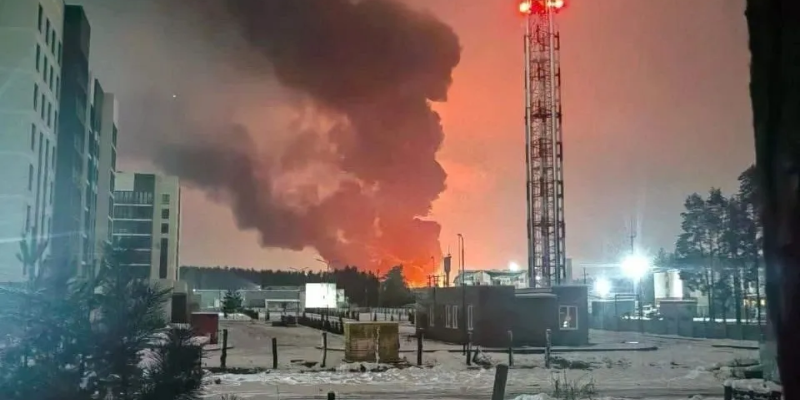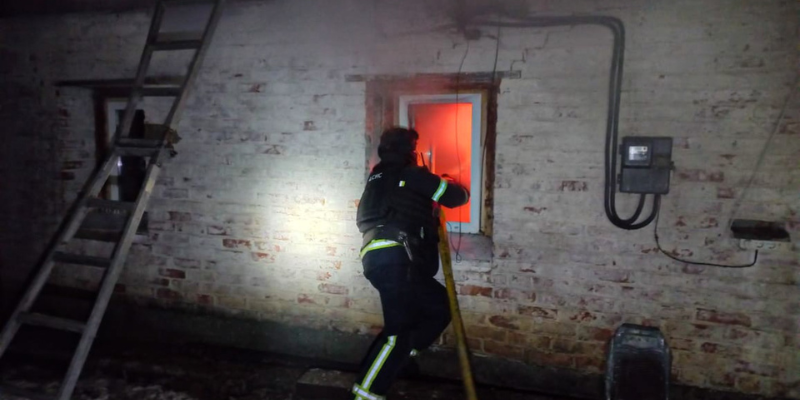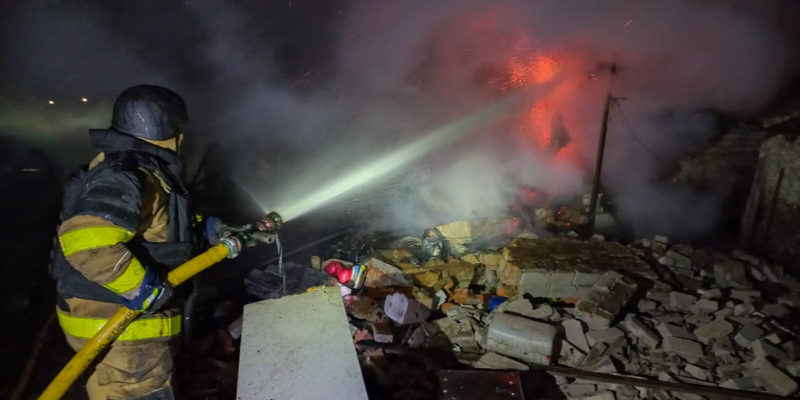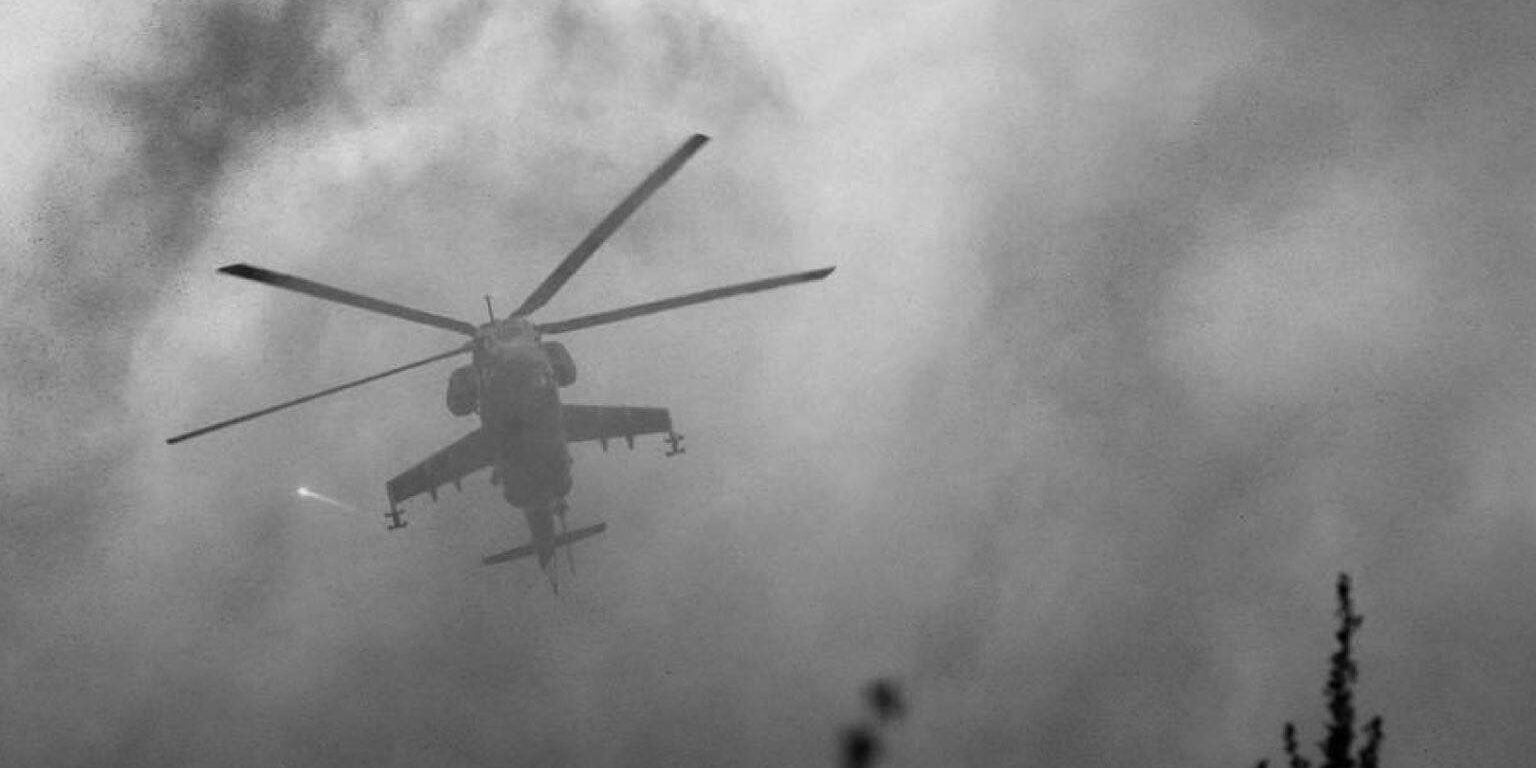Ukrainian drones strike Russian chemical plants, refineries, and airbase infrastructure in Russia

Several strategic targets in different Russian regions were struck by drones in a joint special operation conducted by Ukraine’s Security Service in tandem with defense forces. An explosive fire sparked at the Aleksinsky Chemical Plant where gunpowder is produced in Russia’s Tula region. Munitions depots at the Engels airfield in the Saratov region were also aflame. Furthermore, a large-scale fire occurred at the Saratov oil refinery. Projectiles also directly struck the Bryansk chemical plant, resulting in a large fire with collateral detonations.
SOURCESymbolic number of the Day
Russia launched 80 Iranian-provided Shahed strike drones on Jan. 14 along with other unmanned aerial vehicles (UAV). Fifty-eight of them drones were destroyed, and 21 went astray. Debris from the intercepted drones caused damage in several Ukrainian regions, including Sumy, Kyiv, Zhytomyr, Kharkiv, and Cherkasy. Privately-owned homes and high-rise apartment buildings, vehicles, and public property were damaged.No casualties were reported. Russia launched the UAVs from the Russian cities of Millerovo, Orel, Kursk, and Primorsko-Akhtarsk. The Ukrainian Air Force and other military units successfully repelled the air attack using aviation, manned anti-aircraft missile systems, electronic warfare units, and mobile fire groups.
SOURCEWar in Pictures
Firefighters in Sumy region attacked multiple times while extinguishing an inferno. Overnight on Jan. 13, enemy drones launched an attack on a village in the Konotop district that caused a fire and engulfed a residential area. While the first responders were trying to extinguish the fire in a civilian home, the enemy launched another attack. Fortunately, the rescuers were able to take shelter in time and none of them were injured. Once it was safe, the rescuers were able to completely extinguish the fire. Despite the challenging circumstances, the brave actions of the rescuers prevented any harm to themselves and successfully completed their task.
SOURCEVideo of the Day
Kyiv-based bomb squad clears Russian laid traps in Kharkiv region. A mine-clearing unit from Kyiv has inspected more than 15 kilometers (9.3 miles) of power lines and cleared 10 private households, agricultural land, and a minefield. Despite facing enemy fire, the police sappers cleared approximately 13 hectares (32 acres) of land in a 1.5 months. The specialists successfully removed more than 600 enemy mines and shells left by the Russian occupiers and handed them over to the Armed Forces of Ukraine. Any damaged ammunition that couldn’t be reused was safely destroyed at a training ground.
SOURCEInstitute for the Study of War (ISW) report

Russian state-owned energy corporation Gazprom acknowledged that it is considering reducing the size of its central office staff by 40 percent, indicating that Gazprom may be concerned about the long-term effects that the war in Ukraine and the reduction in Russian gas exports to Europe will have on the Russian gas industry.
Leningrad-based media outlet 47news, which is affiliated with Russian state censor Roskomnadzor, reported on Jan. 13 that Gazprom’s Deputy CEO Elena Ilyukhina sent a proposal to the company’s chairman Alexei Miller, on Dec. 23 arguing that Gazprom’s main office in St. Petersburg should cut its staff by 40 percent from 4,100 to 2,500.
Ilyukhina’s proposal to shrink Gazprom’s workforce is likely an effort to address economic strains due to the reduction of Russian gas exports to Europe since 2022 and Ukraine’s recent refusal to renew a contract to transport Russian gas to Europe via Ukraine. Gazprom official representative Sergei Kupriyanov confirmed the authenticity of the proposal on Jan. 13 during an interview with Kremlin newswire TASS but declined to comment further.
SOURCEWar heroes

On Sept. 7, 2024, 44-year-old Jr. Sgt. Serhiy Oliychuk, call sign Lysyi, was killed near the village of Lysivka, Pokrovsk district, Donetsk region. In the line of duty, he was fatally wounded by an enemy drone.
Oliychuk was born in Halych, Ivano-Frankivsk region, and lived in Rohatyn until 2007. He graduated from the Rohatyn Agricultural College. In 2007, he settled with his family in Lviv. In civilian life, he worked in construction, installing metallic-plastic structures. He loved fishing and dreamed of having his own pond and a house near the forest.
During the full-scale war, the man defended his country in the ranks of the Airborne Assault Forces of the Armed Forces of Ukraine. He served in the 132nd reconnaissance battalion. He was a squad leader. He took part in battles along the Zaporizhzhia and Donetsk axes.
“Having received a call-up, he joined the airborne reconnaissance battalion. He became a scout of his own free will. For his guys, he became a ‘father figure,’ he took care of them as best he could, helped them in everything. I felt in my heart that he would not return, because his hatred for the invaders was greater than his fear. He went forward and fearlessly led his group to an assault,” said Yaroslava, the widowed wife of the fallen defender.
The soldier was buried at Lychakiv Cemetery in Lviv. The defender is survived by his mother, wife, daughter, brother and grandmother.
*Serhiy’s story on the Heroes Memorial – a platform for stories about the fallen defenders of Ukraine.
SOURCELatest news
- India rejects oil tankers that were sanctioned by US on Friday
- NATO Secretary General warns against “peace” at the cost of Ukraine’s interests
- Biden: Putin thought he would capture Kyiv in 3 days, but I was there, not him
- Ukraine’s membership in NATO is higher priority for Ukrainians than membership in EU
- Bloomberg: Europe grows more optimistic Trump won’t abandon Ukraine
- US encounters European skepticism in last-ditch push to seize $300 billion in Russian assets for Ukraine leverage




